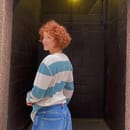I perched on a car seat at the age of 3. The noise of my thoughts, my mother’s worries, and the vibration of car wheels crushing the gravel underneath me rang in my ears. I was always enthralled with New Mexico’s arid climate and abundant sunshine.
My day was about to be filled with fluorescent lights, prodding gloved hands, and blue silicone.
We arrived in a crowded parking lot; men and women bustled about, in and out of the sliding glass doors that marked the entryway to the audiologist. This place felt unfamiliar, and naturally, I was uncomfortable. We walked into the offices, and my mom checked me in for our 4:00 p.m. appointment. The light illuminated the white tiled floors, and I sat and cast finger puppets.
I watched as my mother talked with the receptionist. They both looked calm as if things like this happened every day. I was nervous, though, and I stopped my self-made puppet display. After sitting on the plastic waiting room chairs, we were called up by a big man. He smelled like Axe Body Spray, the kind you get on clearance at Target.
He sat me down, examined my ear with a cold otoscope, and asked my mom questions about our day together. I couldn’t understand what he and my mother were talking about. It should’ve been clear that I was deaf, but I didn’t perceive anything as different until suddenly, surprisingly, a cold and oozy plastic was squeezed into my ears. All at once, and unusually for me, I could hear. Despite the exciting and sudden rush of sound, I wasn’t happy. I was, in fact, mad when I discovered that one of my senses, something that almost everyone else had, was something that I lacked. Of course, it was a completely unprecedented discovery. No one had asked me if this was what I wanted. No one told me it was happening. Nevertheless, I was, sitting on a metal table with plastic in my ears.
The next few years while living in Colorado was confusing. I was the only one to have these robotic FBI earpieces in all my classes, K-12, and it felt lonely.
I am now going to be the person who analyzes people’s hearing for a living. However, the only thing that makes a difference is I know how it feels to undergo such a huge change when someone invades your space with something so unfamiliar. I would be able to provide a relatable aspect with people who are labeled differently due to the societal responses of how “normalcy” is labeled, which would fulfill my life. Communicating is the most important part of someone’s identity because that’s how people can express emotions, ideas, stories, questions, and needs. Everyone needs to be able to socialize with others – it’s how we feel a little less lonely on this huge rock. That’s why I am choosing speech, language, and hearing sciences for my major to become an audiologist. My audiologist will always have a piece in my heart and I’ll never forget her. Tears streamed down my face while saying goodbye to her a week after I turned 21 in April 2024.




